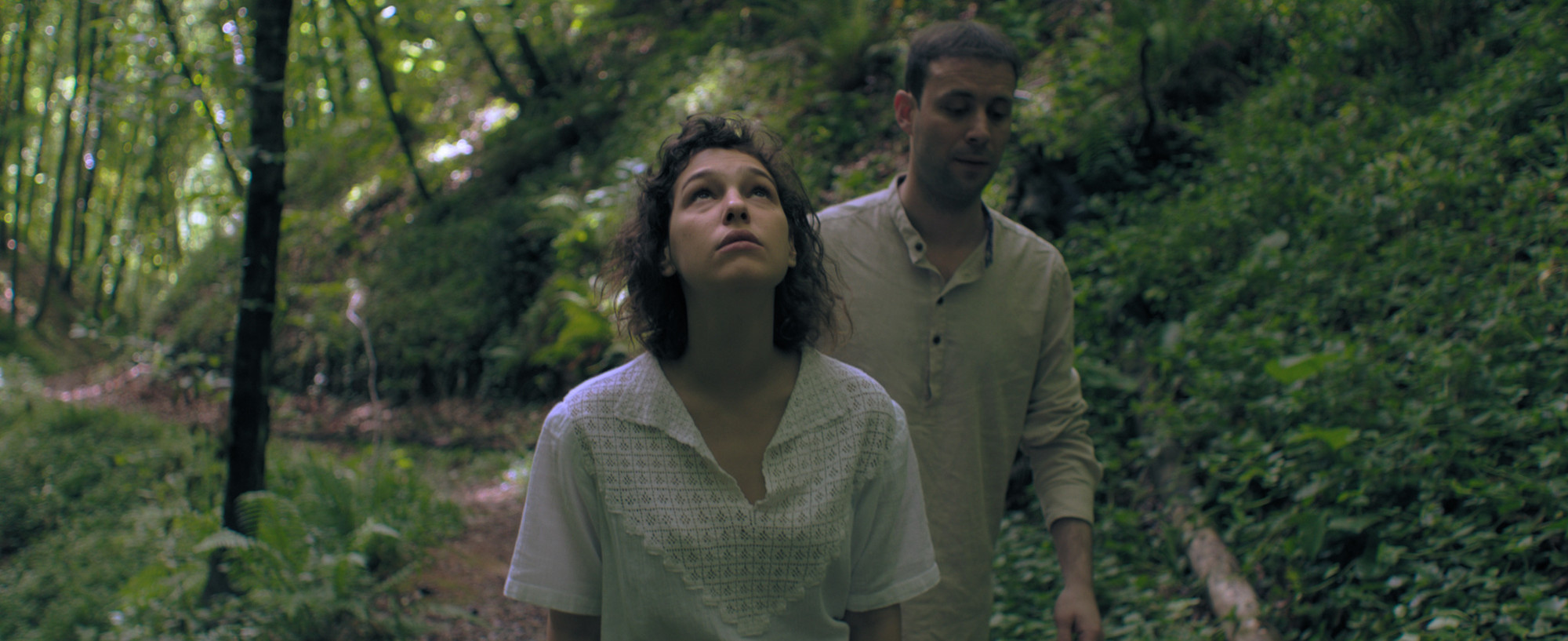As the filmmaker Burak Çevik tells us in the opening narration of Belonging (2019), over a black screen and the sound of rainfall, “It looks like an ordinary tragedy.” The contours of the narrative about to unfold are indeed familiar, in the abstract: a man and a woman meet and share a romantic night; she later convinces him to murder her mother, and the two are apprehended for what became a rather messy crime. In this case, the woman involved is Çevik’s aunt, and the manner in which he tells her story in Belonging transforms it into one that belongs to him.
The film is essentially composed of two parts, following Çevik’s prefatory comments. The first brings together three elements: an ambient electronic soundtrack, which imbues the story with a vaguely menacing, melancholy tone; still-camera sequences of the “scenes of the crime,” like the bar where Orun first spied Çevik’s aunt Pelin, the seaside rocks where he casually came on to her, or the apartment, now cloaked in sheets and filled with rolled-up carpets, where Pelin’s parents lived; and an impassive reading of Orun’s confession. This combination creates a sense of suspense and revelation, as we wait to learn the details of the crime and how it will be resolved, while visiting and dispassionately (as a motionless camera so effectively suggests) examining the spaces where the story took place. The mystery which truly drives Çevik’s retelling, however, comes to the fore in the second half, a quiet recreation of the lovers’ fateful first night and morning together.
This bricolage approach brings Belonging into conversation with Errol Morris’s The Thin Blue Line (1988), which uses the memories of the parties involved to reinvestigate a murder for which the wrong man had been convicted. By presenting different versions of the events, as described by witnesses, and through dramatic recreations, Morris resists the then-disavowed objectivity claims of cinema verité documentary; though he knows who the “true” murderer is and wants to persuade the audience accordingly, he allows this truth to seemingly emerge organically—and irresistibly—from what the film scholar Mary Ann Doane describes as a palimpsest, or “the sum total of the past’s rewriting in time.” Belonging similarly suggests a negotiated engagement with truth, constructed of memories and the “evidence” to be gleaned from the story’s various backdrops. But rather than adjudicating guilt or attempting to re-solve the crime, Çevik probes the impossible rupture of his grandmother’s murder—the human mystery which lies at the heart of our most vicious, inhuman actions, questions far afield of juridical definitions of “guilt” or “innocence.”
The first half is particularly reminiscent of Philip Scheffner’s Revision, a 2012 documentary that reinvestigates the officially unsolved murder of two Romani men in a field on the Germany-Poland border. The film is composed of still-camera records of the place in which the crime occurred, at the same time and with the meteorological conditions intact, alongside interviews with the victims’ families as they are played back to their speakers, who then confirm that the version they’ve presented is as they wish it to be. Scheffner, like Morris, constructs an undeniable portrait of the truth regarding the failures of the police; but in contrast with the interviews of the earlier film, which tend to expose and exploit the narrators, Revision makes valiant attempts to respect the subjectivity of the victims, to provide some element of documentary “justice.”
Çevik’s choice to rely on the text of Orun’s confession for Belonging’s unfolding narrative is a curious one, and vibrates with a compelling contradiction. On the one hand, Orun becomes a more complete, three-dimensional character in the film, presenting some limited explanation for his actions (his desire for a sense of “belonging”), where we learn almost nothing of Pelin’s motivations, condemning her to privacy. On the other hand, the very act of confession reduces Orun to a cog within the wheels of justice, performing the necessary avowal to close the circle of the system’s interest in the story, while Pelin’s unknowable subjectivity remains intact.
Writing about The Thin Blue Line, the scholar Linda Williams praises Morris’s “awareness of the conditions under which it is possible to intervene in the political and cultural construction of truths which, while not guaranteed, nevertheless matter as the narratives by which we live.” In the prologue of Belonging, Çevik shares his hope that by telling his story, he may free himself from a certain obsession with death and dying that permeates his earlier films—to produce a narrative by which he might live. This more personal interest drives the film’s interventions in the documentary tradition, of which Morris’s and Scheffner’s films are a part, a poignant motivation with an uncertain political valence.
Belonging screens tonight, June 14, at Anthology Film Archives as part of the retrospective series accompanying A Woman Escapes.




